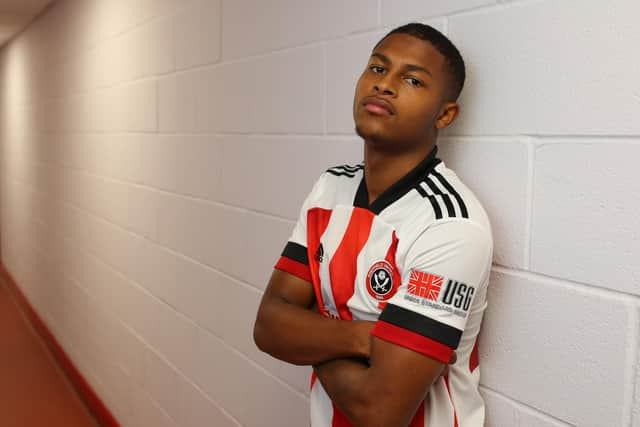The story of how - and why - Rhian Brewster became Sheffield United's record transfer signing following his move from Liverpool
and live on Freeview channel 276
After around a month-and-a-half of sometimes delicate negotiations, Liverpool’s Rhian Brewster was finally in the building and about to be officially unveiled as the club’s record signing. Cue a flurry of activity at kitchen tables across South Yorkshire as reporters, working from home since the Covid-19 outbreak, began making subtle adjustments to their weekend stories. Subtle because, as Chris Wilder had hinted during a Zoom conference that morning, an announcement was imminent.
Despite first making their interest known before travelling to Scotland for a pre-season training camp in August, the path to Brewster’s signature has not always been smooth for United as they battled to acquire the services of a player Jurgen Klopp, his former manager at Anfield, has described as “really impressive.” Indeed, only 48 hours before he was pictured scribbling his signature on a five year contract, Wilder appeared resigned to the fact Brewster would be heading elsewhere as Crystal Palace, Aston Villa, Newcastle and Brighton and Hove Albion all fluttered their eyelashes in the youngster’s direction. The broad smile Wilder wore as he posed with an arm around Brewster’s shoulder masked a deep sense of relief as nearly six weeks of hard slog came to fruition.
Advertisement
Hide AdAdvertisement
Hide AdThe story of how United came to capture the 20-year-old contains chapters on scouting, brinkmanship and financial housekeeping as Wilder’s employers attempt to balance the need to improve his squad with negotiating safe passage through a pandemic which is still forcing clubs to stage matches behind closed doors and costing them millions in lost revenues. It also reveals the complexity of doing deals in an era where all sorts of clauses are inserted into agreements by both the selling club and their asset’s representatives. Liverpool, for example, made it plain they would only consider proposals enabling them to bring Brewster back to the North West for a predetermined sum after Klopp reluctantly accepted he could not offer the England under-21 international regular first team football. Not while Mo Salah, Roberto Firmino and Sadio Mane remain at his disposal.
Although a package was effectively thrashed out between Wilder, Klopp and Brewster’s agent midway through last month, it was not until 24 hours before United travelled to the capital that the details were forwarded, via PDF attachment, to the relevant authorities. After initially investigating the possibility of recruiting Brewster on loan - and then attempting, as was perfectly within their rights, to whittle down Liverpool’s asking price when it became apparent the reigning champions preferred a permanent sale - United finally bit the bullet when Wilder made it clear, during a series of video meetings with their board of directors that his team’s disappointing start to the campaign could largely be attributed to a lack of firepower. Forty-three shots on goal since returning to action following last term’s ninth placed finish, United left the Emirates Stadium still searching for their first win since July and having successfully converted just one.
As is the fashion these days, Liverpool’s sporting director has been identified as the architect of a deal which they clearly believe, given how it has been structured, could help turn Brewster into a genuine superstar. But while Michael Edwards’ fingerprints were on the paperwork, one-on-one talks between Wilder and Klopp were effectively responsible for pushing it through. Highlighting the statistical spreadsheets and algorithms people like Edwards, a graduate of Sheffield University, use to influence their work makes for a sexy line in a newspaper or internet article. The truth of how these moves come about, however, is often much more mundane.
Aware that Brewster’s other suitors could all afford to pay higher transfer fees and salaries, Wilder’s pitch to Klopp, who suspects the striker might still have a future with Liverpool, was based on what United could offer in footballing rather than financial terms. Their high pressing style is similar to the one Klopp has employed so effectively since taking charge in 2015 meaning, as Wilder was quick to emphasise, Brewster will be better equipped to perform if he ever does rejoin his former club. Equally, with United crying out for a prolific finisher, Brewster would be more likely to enjoy regular action there than, say, The AMEX Stadium or Selhurst Park - where Roy Hodgson already has Wilfried Zaha, Michy Batshuayi, Jordan Ayew and Christian Benteke at his disposal. That argument clearly resonated with Klopp, who made no secret of his admiration for Wilder’s approach following Liverpool’s last two meetings with United. He made his feelings on the subject known, after the two had shared several telephone conversations, to both Edwards and Liverpool’s American owners.
Advertisement
Hide AdAdvertisement
Hide AdDespite hailing from Chadwell Heath and initially enrolling on Chelsea’s youth programme, Brewster’s advisors were also keen for him to remain in the north, reasoning that fewer distractions would mean quicker progress. Again, prioritising sporting benefits above financial rewards, they decided United’s offer was the most attractive.


Having invested around £23.5m in Brewster, United will of course be expecting him to hit the ground running, score goals and bring the best out of their other attacking options including Oliver Burke, David McGoldrick, Oli McBurnie and Billy Sharp. Although he has only made 26 senior appearances, 22 of those coming during a spell on loan with Swansea City last season, Brewster’s showreel is already extensive enough to confirm he will bring a different dynamic to United’s frontline - nine of the 11 goals he scored for City came from ‘first touch’ finishes. A 10th would be most welcome when Wilder’s squad attempt to open their account for the campaign later this month, against Fulham at Bramall Lane.
